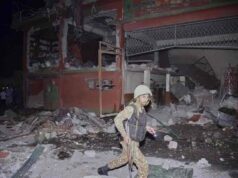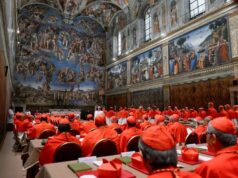AFSPA CAN NEVER BE PERMITTED TO BE DILUTED AT ANY COST
Dilution or Repealing of AFSPA in Kashmir, a long-standing demand of human rights groups, was again raked up by the vanishing Congress party. This party is now promising to kill the Act if it is voted to power. As if all others will just accept such nonsense and blatant anti Army stand of this so called National level political party. Apart from giving powers to the Army to enforce law and order in disturbed areas, AFSPA protects the Army from litigation in human rights violation cases. The Congress wants to remove this legal cover with respect to “enforced disappearance, sexual violence or torture”.
Therefore Prime Minister Narendra Modi on Monday summarily dismissed any talk of repealing the controversial Armed Forces Special Powers Act (AFSPA) in Kashmir, likening the removal of AFSPA from the Valley to “sending our soldiers to the gallows.”
The prime minister said this after releasing the Bharatiya Janata Party’s election manifesto which put nationalism and national security at the front and centre of its next term, if re-elected. In the middle of a high-voltage election campaign on the theme of nationalism and patriotism — in full bloom after the Balakot air strike deep inside Pakistan — the Congress has gone down to such low depth of anti nationalism. “We are on the verge of eliminating terrorism. Terrorists are demoralised, we are winning a psychological war against them. Instead (of backing such efforts), the Congress manifesto is soft on terror. Their views on the Army are similar to those of Pakistan. No patriot will tolerate this language. Their manifesto talks about removing AFSPA. This amounts to removing weapons from a soldier’s hands. Is this right?” asked PM Modi.
The charges of excesses and human rights violations by the Army in Kashmir are totally exaggerated. Indian Army was an army of peace and operates in the most restrained manner. “Indian soldiers have been part of the United Nations’ peacekeeping force right from its inception. And we send the maximum number of soldiers on UN peacekeeping missions. The discipline of Indian soldiers and their devotion to duty have always been praised. It isn’t seemly for a party that has been in government for 50-60 years to speak this kind of language.”
There is nothing called as working towards a time-bound withdrawal of AFSPA in Kashmir. It has to be there till the Forces require it to eliminate terrorism. It was best that conditions did not exist for imposition of AFSPA in the first place. “First, we must create an environment where AFSPA is unnecessary, like we did in Arunachal Pradesh. We removed it from a few districts. We then removed it from some states. We were the first to take such a step since 1980. But we have maintained law and order. The government must have the power to protect its armed forces. Only then will they have the morale to fight. Removing AFSPA from Jammu and Kashmir is the same as sending our soldiers to the gallows. I will never let this happen to our soldiers,” he said.
With regard to Articles 35A and 370 also, the prime minister was equally vehement, this time, for their abrogation. Within minutes of the release of the BJP manifesto, Farooq Abdullah and Mehbooba Mufti issued dire warning of bloodshed in the Valley. Asked to comment on their reaction, Modi said: “The problem in Kashmir is largely due to the 50-odd political families there. They have been milking the issue. They don’t want any benefit to be given to the ordinary Kashmiri. They use public sentiment for political gains. These days the income tax department has cracked down on such elements. While stone-pelters are funded by Pakistan to protect militants, but when there is crackdown by the NIA on terror operators, people stand outside their homes and clap. The people of Kashmir want freedom from such political families who have been preying on their emotions for 50 years. The situation in Kashmir is such that people want change, whether it is about Article 35A or Article 370.”
The Prime Minister addressed several other issues such as the impact of the mahagathbandhan in Uttar Pradesh, Rahul Gandhi’s Rafale campaign, relations between India and China, economic growth, demonetisation and why he thinks if Sardar Patel had been prime minister instead of Jawaharlal Nehru, India would have achieved lot more success a lot faster.




